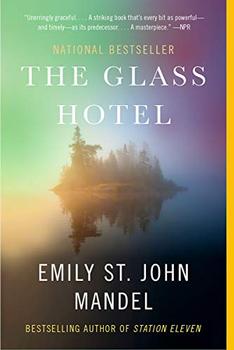Reading Guide Questions

Please be aware that this discussion guide will contain spoilers!
- On page 35, Raphael tells Walter, "Our guests in Caiette want to come to the wilderness, but they don't want to be in the wilderness. They just want to look at it, ideally through the window of a luxury hotel." Examine the meaning of Raphael's words, paying close attention to the ways in which this notion of curated reality permeates the novel. In what other instances is the truth framed in such a way so as to distort it?
- Explore Paul and Vincent's relationship. What are their earliest memories of each other? How does their relationship evolve as both characters move into adulthood? Why is Paul compelled to pass Vincent's videos off as his own? Is either character able to achieve closure with respect to their relationship?
- Discuss Vincent's five-minute videos. What meaning does she find in this practice? Why does she choose water as her primary subject? Consider, as you answer this question, her grandmother's words when she first gave the camera as a gift: "If you can't stand to look at the world directly, maybe it's possible to look at it through the viewfinder" (page 68).
- Explore the theme of opportunity as it is depicted in the novel. What opportunities are available to Vincent? To Paul? To other young people in the early aughts? How does each character's access to opportunity—or lack thereof—affect their fate? Is there such thing as a "good opportunity"? Why or why not?
- Discuss the concept of the "counterlife," as Alkaitis experiences it. How is the counterlife different from memory? Which characters populate Alkaitis's counterlife, and who is conspicuously absent? Is the counterlife a source of comfort for Alkaitis, or does it pain him to think about it? Which other characters are plagued by the notion of what might have been, and how do they conceptualize it?
- On page 293, Mandel writes, "There are so many ways to haunt a person, or a life." Explore the motif of ghosts in the novel, paying close attention to what it means to be haunted. Who—or what—appears as a ghost in the novel, and to whom? What do these ghosts represent to the people who see them? Are the ghosts a welcome presence, or are they a source of terror?
- When Oskar is cross-examined about his participation in the Ponzi scheme, he says, "It's possible to both know and not know something" (page 168). What do his words suggest about the interplay between loyalty, morality, and denial? Who else in the novel might make a similar claim of knowing and yet not knowing something?
- Consider the role the financial crisis of 2008 plays in the novel. Which characters are affected, and how? What ways do they find to cope, and what do their lives look like in the aftermath? Are they able to move forward—and to find happiness? What do these outcomes suggest about the possibility of starting over?
- Examine the intersection of success and morality in the novel. What constitutes success, and what conditions are necessary for one to achieve it? Which characters achieve success, and which characters fail to do so? Is success a corrupting influence? Consider, as you answer this question, Jonathan's company, Vincent's unofficial marriage, Leon's career, and Paul's music.
- Explore Alkaitis's understanding of his crimes. What motivates him to defraud his investors, and why does he maintain friendships with some of them? Does he realize that what he's done is wrong, or does he believe he's been unfairly punished? Why does he insist that he acted alone in the perpetration of the Ponzi scheme?
- Consider Vincent's decision to live onboard a ship after Alkaitis's crimes come to light. What does she hope to experience there? Is she ever fully able to leave her previous life behind? Does she find true happiness as Vincent Smith?
- Examine Olivia's character. What draws her to Alkaitis, and what do these two characters represent to the other? How does Alkaitis's betrayal change the course of Olivia's life? Why do you think Vincent sees Olivia's ghost right before she dies, and what does this apparition suggest about Vincent's understanding of Olivia's fate?
- On page 78, Mirella tells Vincent that "money is its own country." What constitutes citizenship in the country of money? What are its customs? What other secret worlds and subcultures operate within the novel, and what social boundaries exist between them? Is it possible to move back and forth between these different worlds? Why or why not?
- Explore the theme of interconnectedness as it is portrayed in the novel. In what ways are the different characters connected? Are they aware of these connections, or do their ties remain largely invisible? What qualities of the modern world facilitate these connections? Is connection a guaranteed cure for loneliness? Why or why not?
- Discuss the conclusion of the novel, exploring, as you do so, the symmetry between Vincent's death and that of her mother. How do you understand Vincent's fate? Do you agree with Vincent that her mother's death was an accident, as she asserts in the final paragraph of the novel? Why is Vincent able to come to peace with her mother's death only after she herself dies?
Unless otherwise stated, this discussion guide is reprinted with the permission of Vintage.
Any page references refer to a USA edition of the book, usually the trade paperback version, and may vary in other editions.






